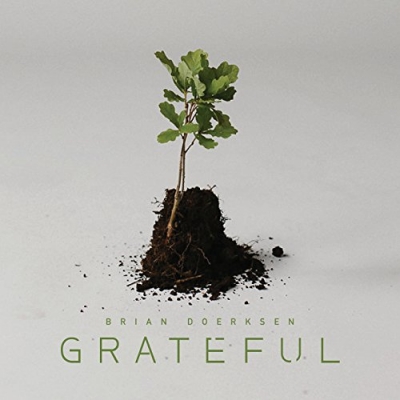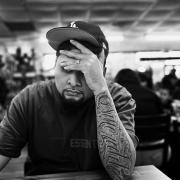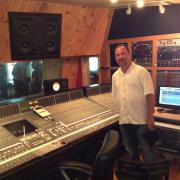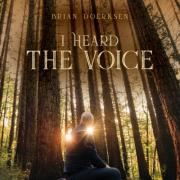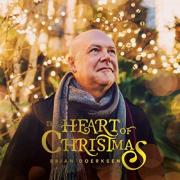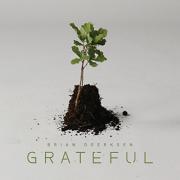Interview: Brian Doerksen
Renowned songwriter and worship leader Brian Doerksen recently released his latest album 'Grateful'. LTTM caught up with this stalwart of the Christian music world to find out how he returned from a time of darkness to deliver another trademark album, and we seek his advice for budding songwriters starting out. Read on to be inspired by one of the most respected men in the business!
You have a new single out at the moment titled 'If Jesus Is The Face of God' - tell us a little about the story behind that song and the message it brings.
I went through a prolonged season of several years where I was struggling with depression and deep discouragement. One of the causes was that I had made some errors of judgment with some people I agreed to partner with, and I blamed myself. The result was that I stopped believing in myself and my ability to make good decisions. This killed the creativity inside me, and perhaps predictably, the songs stopped. Eventually reading the gospels I started noticing something about Jesus’ encounters with the marginalized, the misfits, and all those discouraged and broken. He would in essence say to them ‘I believe in you.” I aware that those are not the exact words Jesus said as each situation was different, but that was my paraphrase. (The word ‘believe’ in this context is meant to convey being for someone and wanting the best for them.) As people of faith we are so focused on expressing our belief in God, but we need to experience the source; that God believes in us and that we are loved unconditionally just like a mother loves each of her children. I can’t recall exactly how the song started, but I’m pretty sure hearing or reading the following quote from Richard Rohr was part of the song’s genesis.
“If God is Trinity and Jesus is the face of God, then it is a benevolent universe. God is not someone to be afraid of, but is the Ground of Being and on our side.”
Yes! My heart resonates so deeply with this. God is on our side. God believes in us. One final note about the arrangement. From the beginning, I heard a gospel choir in my head (which is not my typical style.) I’m so thrilled that Marcus Mosely and some of his choir stepped into the recording studio and were able to sing their hearts out better than my imagination. What incredible voices he and his whole group has!
Earlier this year you released your latest album 'Grateful' - what was the inspiration behind that and what are some of your favourite songs on it?
Where do I start? Every song on the project means so much to me. Let me comment on a few.
Grateful For Another Day opens the album and sets the tone.
When I was in my long season of disorientation and darkness I found one simple thing began to make a difference. I started asking myself ‘Brian - what are you grateful for today’? It didn’t need to be something big or profound. Simple things like a cup of water, food to eat . . . big things like having a wife who believed in me and loved me. This song is the way Joyce and I like to start the day. This song is also the sound of friendship. I’ve been blessed to be part of a band called ‘The SHIYR Poets’ made up of Calum Rees, Brian Thiessen & Teresa Trask. (We are creating new folk-rock settings of the Psalms in sequence - currently finishing up Volume 3 which is Psalm 21 - 30) When we were on tour in India in November 2016, we had a day off in Chennai on my birthday. I told them - the best birthday present for me would be to have some ‘hang out’ time and to work together on helping me finish this song. They contributed some great melodic and musical ideas and we finished writing the song that very day - on my birthday. And then Brian Thiessen and Teresa Trask sang it with me on the recording. I’m grateful indeed.
Scars On His Hands was my first new original song in over 5 years, and it restarted my songwriting engine. It’s written in the vein of the ‘spirituals’ and is about this profound realization that the King we serve and love is not like the kings of the earth. This King has scars on his hands . . . this King has suffered so he doesn’t recoil from our expressions of grief. This King knelt down and was not only a servant, but a slave; a servant who has no option to leave . . . That’s what it says in the great Christ Hymn in Philippians 2!
The album closes with ‘Everlasting Arms’, one of my personal favourites of any of the songs I’ve ever written and a fitting conclusion to the album (and to many of my current live concerts). I wrote it in response to a couple we knew who were going through a hellish season in their business after being defrauded. They walked with such integrity yet were suffering greatly. I was pondering the challenges we go through in life and the question always comes up; ‘Where is God in this?’
Then I remembered this verse from the Old Testament.
“The eternal God is your refuge, and underneath are the everlasting arms.” Duet 33:27
It struck me that we often speak of God being the God above - looking down and causing things to happen. The sovereign king etc. But what if God is underneath, ready to catch us when we fall . . . and underneath all things good and bad are these arms of love. It was just such a helpful comforting image and metaphor. I walked over to the piano and this song poured out. Shortly after I was able to share this song with this couple and it seemed to connect and help them, and now it’s helping others too.
Over the years you've written some of our personal favourite worship songs here at LTTM, such as 'Come, Now Is The Time To Worship', 'Refiner's Fire' and 'Hallelujah (Your Love Is Amazing)' - out of all the songs you've written, which ones mean the most to you and why?
I think ‘Come now is the time to worship’ will always be up there because of what was happening in my life at that time and where I was when I wrote the song. We had tried to launch a musical about the ‘father wound’ in culture called ‘Father’s House’ and while it started strong (with the album of songs selling well via word of mouth) the stage musical ended up collapsing under the weight of costs and other factors costing us losses in the hundreds of thousands of dollars. We were homeless with 5 young children because we had sold our home and put in all the equity to try and keep the project afloat and it wasn’t enough (thankfully our parents and some friends were willing to take us in, so we were not literally sleeping rough on the streets). In the middle of that season of loss, we were offered a job in the UK training the worship leaders and songwriters of the Vineyard churches. We came in weakness and struggle in the aftermath of the collapse of the musical, and a couple of months into our time there one morning I was doing my exercise walk on the streets of SW London and this song came floating on the air. I heard it almost audibly. “Come now is the time to worship . . .” My response was ‘Now?’ ‘Now . . . when I’m barely hanging on to my faith in my season of disappointment and death of a vision?’ That’s why I wrote words like ‘Come just as you are.’ The ‘just as you are’ for me was one of disillusionment and confusion, yet God was still inviting me. In the 2nd section of the song (One day every tongue . . .) I’m singing about this sense that worshipping God is our destiny . . . so why not choose him now and experience the pleasure of knowing God and being at peace.
When you're leading worship, do you ever get bored when people ask you to play those same songs you've been playing for years?!
I suppose there are times now when I tire a little of singing ‘Come’ and my other most known songs, yet they still hold a special place in my heart. I take these requests as an encouragement - they are only asking because those songs have meant something to them. And to have that experience as a songwriter is a real gift.
When you've written so many songs, does it become harder to find new ideas and inspiration to keep on writing new songs?
Actually I’m writing more than ever these days. That’s because there will always be ‘gaps’ - when I can’t find a song that says what I want to say in my mother tongue (a musical style I can relate to along with the language and the lyrical style) I write one. And for me, songwriting is life. When I’m writing I feel alive. And coming on the heels of a multi-year season of losing my words, just the fact that I’m writing makes me so grateful. Last week I wrote a love song for a couple we knew and played it at their wedding reception. It’s likely a song that no one else will ever hear, yet it feels like one of my better songs (called ‘You fill my sad spaces’.)
What advice would you give to young worship leaders and songwriters?
For young worship leaders I would say this. Don’t get swept up in the ‘intensity movement’ of the moment. There’s this trend where people think that to ‘really worship’ they need to generate this intensity in every set (and sometimes in every song) and its unsustainable. It may feel real in the moment, but ultimately its false because it’s generated by our sound system, lights and our musical arrangements. Perhaps it’s connected to our addiction to adrenalin. The worship of God is rooted in a life, an ordinary life of faithful love. It’s also rooted in ancient practices that include silence and service. What we need more of is ‘emotionally healthy worship’ which includes songs of lament alongside songs of joy and gratitude.
For songwriters, I would say this. I believe that the best songs are songs that are written for a gap. You have this ‘aha moment’ . . . I need to sing a song that says ‘whatever that gap is’ and if you can’t find a song that says what you need/want to say in your mother tongue then you have your writing assignment (by mother tongue I mean the musical and lyrical style that you can own and sing from your heart.)
The flip side of this is also true - if you can find a song already written that says what your heart needs to say, we should have the humility to sing someone else’s song and thank them. (This is one of the reasons why on every album I’ve ever recorded I have sung at least one song that I didn’t write - we need each other. On the Grateful project it’s ‘We cannot measure how you heal’ by John Bell of the IONA community in Scotland, a modern hymn of real beauty and depth and honesty.)
The other thing I would say is that songwriting is not magic (or just a spiritual experience!) It’s a craft that one can learn over time, but it takes time and investment and focus to learn. That’s why I developed 3 three credit courses (a total of 78 classes of 75 minutes each) on learning the craft of songwriting. I love teaching on this, though the more I teach, the more I realize that I’m just scratching the surface of this important art form.
You must have worked with a huge number of songwriters and musicians over the years, but is there anyone you've never worked with that you would love to one day? (Christian or Secular!)
The Brilliance (David Gungor & John Arndt) as far as ‘Christian/Spiritual’ artists, and BONO (U2) in the mainstream world.
How would you define success in your career?
In one word; Faithfulness. So often we focus on things we can’t control (like sales numbers, awards etc.) but the only thing we can control is our attitude and the choices we make to be faithful & loving. And on top of our attitude and life choices, we can also choose to invest in our craft, to work on ways to do what we do in more effective and fruitful ways. I suppose the other way I would define success as having written songs that people have taken and sung as their own; that those songs said what they needed to say. Lastly, and perhaps now more importantly, I would define success by the way that I mentor and train other songwriters and encourage them to find their voice. I have a particular passion to teach songwriting, and when one of my ‘students’ writes a song that touches other people I feel a deep sense of satisfaction. Perhaps I’m most successful when I help someone else succeed.
What is your favourite album by any artist of all time?
That’s a very difficult question to answer for two reasons; life is seasons and in each season I would likely choose a different album. (My wife calls me ‘Husband #5 which means that after 34 years of marriage she’s watched me go through several fairly major shifts in how I do & view life.) So if I’m allowed I’ll name 4 of my favourites:
Town To Town - Phil Keaggy (most important album of my youth)
All Is Not Lost - The Brilliance (most important spiritual album of the past decade)
Joshua Tree - U2 (favourite mainstream album from my young adult years)
Before This World - James Taylor (favourite mainstream album of the past 5 years)
What does the next year hold for Brian Doerksen?
‘It’s beginning to sound a lot like Christmas’. I’ve been researching and writing for my first Christmas album since summer and I’m really enjoying the process. I’ve been asked many times over the years when I was going to put out a Christmas project . . . and now finally the timing feels right. Christmas is this amazing season when we prepare ourselves through Advent, and then celebrate the incarnation. It’s also a season of sadness for some of us as it brings our losses into sharp focus. A few years ago my mother passed away in November. That Christmas was heartbreaking for me. There was such a hole without her. Out of this experience I wrote a song called ‘Christmas Is The Saddest Season’. I think there’s a lot of people silently grieving while everyone is celebrating. I’ve tried to always make room for lament in my role as a worship leader and as a songwriter and the Christmas project will include this as well. Of course - there’s also going to be joy and peace. Hopefully an ‘emotionally healthy’ Christmas album. The project will likely be about 2/3rds new original Christmas songs, with the rest being my take on my favourite worshipful Christmas classics. If all goes well, it will be out for Christmas 2019.
In the meantime, I continue to do some touring (a mix of concerts and training workshops) in Canada, Europe and Asia. I’m part of a new faith community where we are experimenting with mixing the new with the ancient practices of worship called ‘the Table.’ And perhaps most importantly, I continue to live an ordinary life of love in my marriage to Joyce (34 years now) and being a father to our special needs boys (our baby Isaiah just turned 19!) who require daily support and care.
